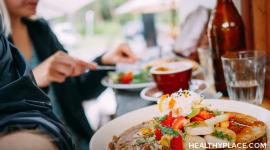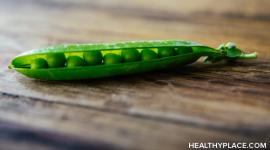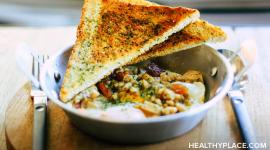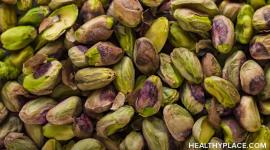Sugar and Anxiety: How Sugar Can Make Your Anxiety Symptoms Worse
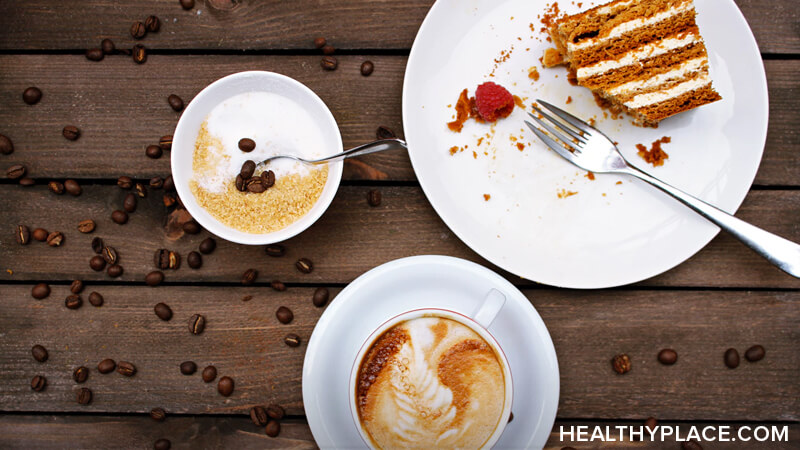
Sugar and anxiety often team up to make you miserable. Sugar is something that many people eat a great deal of because it lurks in so many places. This can be problematic because sugar can make your anxiety symptoms worse. Because sugar and anxiety are connected, and sugar can make anxiety symptoms worse, it makes sense to make some adjustments to reduce the amount of sugar we’re consuming.
Sugar has been found to be so detrimental to our mental and physical health that the authors—a neuroscientist, psychiatrist, and medical science journalist—of the book The Psychobiotic Revolution: Mood, Food, and the New Science of the Gut-Brain Connection boldly proclaim,
“You can probably make no single change to your diet that will be as good for your health and well-being as cutting down on sugar.”
Sugar and Anxiety: How Does Sugar Make Your Anxiety Worse?
It’s long been theorized that sugar causes anxiety. Studies are showing that there is a correlation and that yes, sugar can make your anxiety symptoms worse.
One way in which sugar contributes to anxiety is related to our blood sugar levels, also known as blood glucose levels. When we eat or drink refined sugar or artificially processed sugar substitutes, this is the basic process that happens in our bodies:
- We experience a burst of energy as the body effortlessly and rapidly digests these simple carbohydrates
- The body burns fuel from simple carbohydrates quickly because there’s not much to simple carbs on the molecular level
- As this happens we experience a crash because our blood sugar levels have plummeted quickly
- The crash is frequently accompanied by symptoms of anxiety (especially the physical symptoms of anxiety such as shakiness, rapid heartbeat, heart palpitations, and sweating)
- Often, to get out of the crash or because we crave a certain food or beverage, we consume more foods that are high in refined sugars
- The cycle repeats itself
This pattern of blood sugar spikes and crashes is hard on the brain and leads to symptoms of anxiety. Further, there’s a connection between sugar and anxiety attacks.
In this cycle, when blood sugar suffers extreme swings from high to low and back again, the brain tries to deal with the stress by releasing hormones like cortisol and adrenaline. The release of these hormones can make your anxiety symptoms worse as well as contribute to new anxiety and anxiety attacks. Indeed, the relationship between blood sugar and anxiety is strong.
There’s an additional link between sugar and anxiety. When you consume too much sugar, the amount of a protein called brain-derived neurotropic factor (BDNF) decreases. BDNF plays an important role in reducing anxiety, panic, and stress reactions, so a deficiency can exacerbate these conditions.
Sugar and anxiety are connected, with sugar making your anxiety symptoms worse by affecting the stability of your blood sugar levels and interfering in the production of BDNF. Sugar disrupts the body’s natural physiology, and one of the consequences is anxiety and even panic attacks.
What To Do About Sugar and Anxiety
The bottom line: eat less sugar and more nutritious foods for anxiety. While that’s the goal, it’s helpful to look at in pieces and create a plan for reducing sugar gradually. This way, you avoid intense cravings that can sabotage your progress.
With a plan in mind to gradually eliminate sugars from your diet and add healthier foods for anxiety, you can choose one or two types of sugary foods to eliminate. This list of sugary foods that can make your anxiety symptoms worse can help you know what to change and in what order you want to make those changes.
- Soda, including diet soda
- Fruit juice (it has more nutrients than soda, but still lots of sugars)
- Caffeinated, sugary beverages (like coffee drinks – a double whammy of sugar and caffeine)
- Bread made with refined flours
- Pasta that isn’t whole grain
- Tortillas made with white flour
- Really, any carbohydrate that isn’t made with whole grains
- Refined snacks like cupcakes, doughnuts, pies, cookies, candy, ice cream, etc.
Watch ingredients labels for the word “sugar” as well as it’s hidden cousins. Anything with “-ose” in it is a sugar (fructose, sucralose, etc.). Agave, while natural, is considered a sugar that is bad for you. Honey is better for you, but it is sugary, so moderation is important.
Also, while there’s a proven connection between sugar and anxiety, everyone is different. What affects you greatly might not affect your friend and visa versa.
If you have anxiety, it might be worth it to decrease the amount of sugar in your diet. It makes quite a difference for many people (again, everyone is different, so personal responses vary). Choose something to taper, and then gradually eliminate other foods that cause, trigger or worsen anxiety as well. You might discover that your anxiety almost completely disappears without all the sugar interfering in the workings of your brain.
APA Reference
Peterson, T.
(2021, December 21). Sugar and Anxiety: How Sugar Can Make Your Anxiety Symptoms Worse, HealthyPlace. Retrieved
on 2026, February 10 from https://www.healthyplace.com/anxiety/food-and-anxiety/sugar-and-anxiety-how-sugar-can-make-your-anxiety-symptoms-worse
